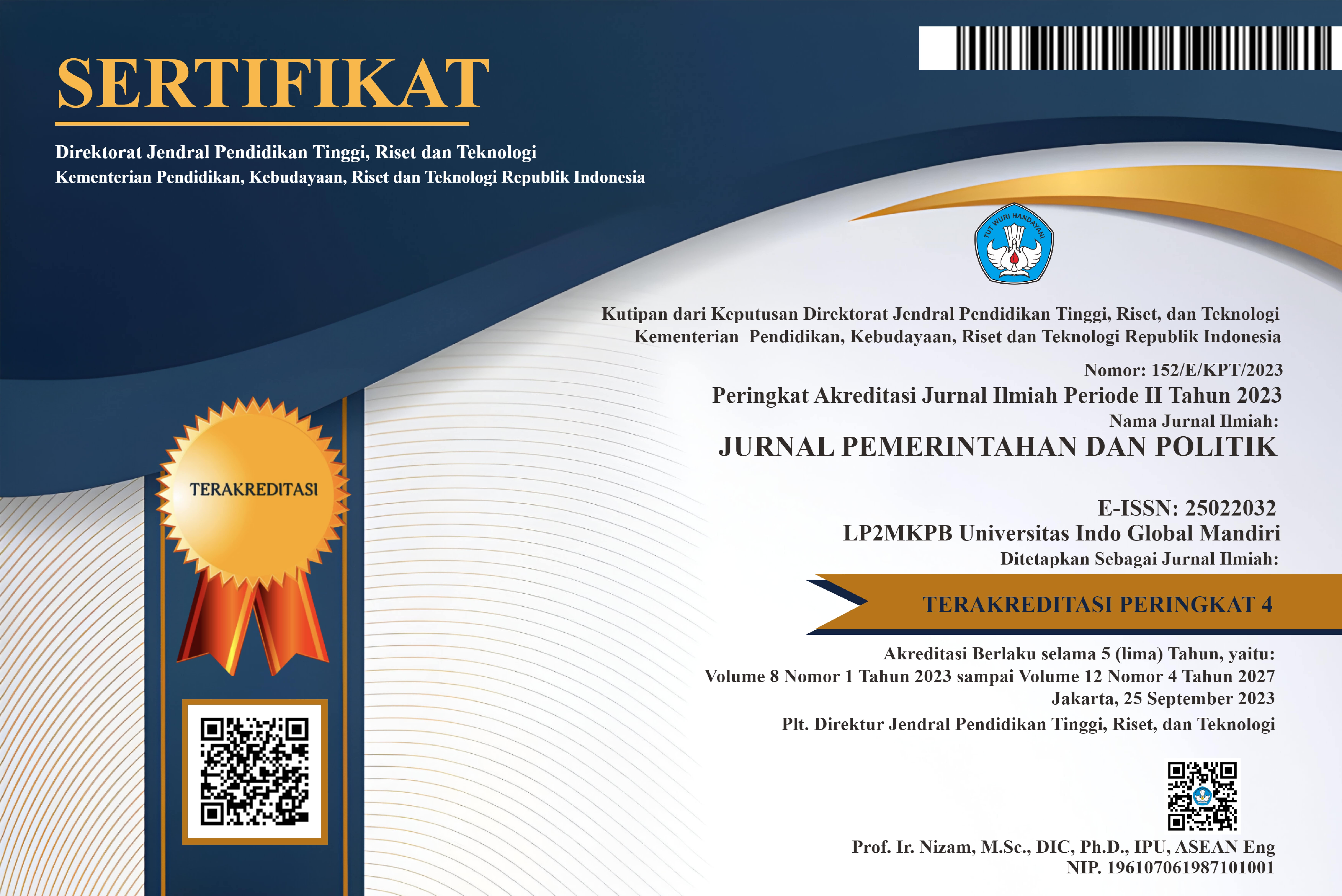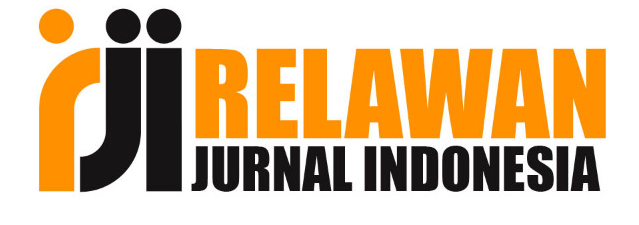“Green Aisyiyah” : Praksis Ekofeminis Gerakan Aisyiyah dalam Mengatasi Perubahan Iklim di Indonesia
DOI:
https://doi.org/10.36982/jpg.v8i3.2205Keywords:
Green Aisyiyah, Ecofeminism, Aisyiyah Movement, Climate ChangeAbstract
This study aims to identify the Green Aisyiyah Program as a realization of the eco-feminist idea of dealing with climate change in Indonesia. The Green Aisyiyah Program is a program initiated by the Division of the Environmental Agency for Disaster Management (LLHPB), as one of the divisions within the structure of the Aisyiyah Movement. In elaborating this research, using qualitative methods with a phenomenological approach supported by Green Politics theory and ecofeminist theory. The results of the study explained that the Green Aisyiyah program is synonymous with empowering women to commit and contribute to protecting the environment in a sustainable manner in anticipation of climate change, various derivatives of the Green Aisyiyah program such as Green Ramadan, Green Eid al-Fitr, and Green Eid al-Adha were constructed through various activities that are very close to the daily lives and lives of women as agents of change because it cannot be denied that women are an important subject in access to natural resources, food and the environment.
References
Books and Journals :
Aardal, B. (1990). Green Politics: A Norwegian Experience. Scandinavian Political Studies, 13(2), 147–164. https://doi.org/10.1111/j.1467-9477.1990.tb00434.x
Amaliatulwalidain. (2019). Peran Dan Partisipasi Politik Organisasi Nasyiatul Aisyiyah Dalam Menginternasasikan Kebijakan Berperspektif Gender Di Kotapalembang Tahun 2016. Jurnal Pemerintahan Dan Politik, 2(1), 12. https://doi.org/10.36982/jpg.v2i1.646
Amaliatulwalidain, N. A. (2022). "Green Aisyiyah" : Contribution and Role of the Aisyiyah Movement in Anticipating the Impact of Climate Change in Indonesia. Asia For Earth, 291.
Arora-Jonsson, S. (2011). Virtue and vulnerability: Discourses on women, gender and climate change. Global Environmental Change, 21(2), 744–751. https://doi.org/10.1016/j.gloenvcha.2011.01.005
Baker, S. (1993). The Principles and Practice of Ecofeminism: A Review. Journal of Gender Studies, 2(1), 4–26. https://doi.org/10.1080/09589236.1993.9960526
Brian Tokar. (2004). Movements for climate justice in the US and worldwide Brian Tokar. In ROUTLEDGE HANDBOOK OF THE CLIMATE CHANGE MOVEMENT (Issue 1, pp. 1–14). Routledge.
Dankelman, I. (2013). Climate change: Learning from gender analysis and women's experiences of organising for sustainable development. Gender & Development, (Issue 2008, p. 21).
Denton, F. (2002). Climate change vulnerability, impacts, and adaptation: why does gender matter? In R. Masika (Ed.), Gender, Development, and Climate Change (p. 10). Oxfam.
Dianne Rocheleau, Barbara Thomas-Slayter, E. W. (1996). GENDER AND ENVIRONMENT A feminist political ecology perspective. In D. Rocheleau) & and E. W. Barbara Thomas-Slayter (Eds.), Feminist political ecology. Global issues and local experiences (p. 3). Routledge. https://doi.org/10.2307/3060380
F, F. (2022). The Impact of Climate on Flood Disasters in Indonesia Faradiba. International Journal of Progressive Sciences and Technologies (IJPSAT), 31(1), 364. http://repository.uki.ac.id/8116/5/TheImpactofClimateonFloodDisastersinIndonesia.pdf
Faradiba, F. (2021). Determination of Climate Factors in Flood and Drought Disaster in Indonesia using Instrumental Variable (IV) Methods. Jurnal Ilmu Fisika | Universitas Andalas, 13(1), 54–61. https://doi.org/10.25077/jif.13.1.54-61.2021
Gupta, A. (2016). Climate Change and Kyoto Protocol: An Overview. In Vikash Ramiah & Greg N. Gregoriou (Ed.), Handbook of Environmental and Sustainable Finance (Issue December 2016, p. 9). Elsevier Ltd. https://doi.org/10.1016/B978-0-12-803615-0.00021-2
Jacobs, S. (2013). Agrarian reforms. Current Sociology, 61(5–6), 862–885. https://doi.org/10.1177/0011392113486660
Jain, S. (2011). Ecological Movement A Case Study of Women's Role in the Chipko Movement in Uttar Pradesh. Economic And Political Weekly, 19(41), 1788–1794.
Lowndes, V., Marsh, D., Stoker, G., Editors, S., Peters, B. G., Pierre, J., & Stoker, G. (2018). Theory and Methods in Political Science. Theory and Methods in Political Science. https://doi.org/10.1057/978-1-137-60353-1
Mariah, M. (2010). Indonesia: A Vulnerable Country in the Face of Climate Change. Global Majority E-Journal, 1(1), 46–56.
Mellor, M. (1992). Green Politics: Ecofeminist, Ecofeminine or Ecomasculine? Environmental Politics, 1(2), 229–251. https://doi.org/10.1080/09644019208414022
Nilan, P., & Wibawanto, G. R. (2015). “Becoming” an environmentalist in Indonesia. Geoforum, 62, 61-69.
Perdinan, P., Atmaja, T., Adi, R. F., & Estiningtyas, W. (2019). Adaptasi Perubahan Iklim Dan Ketahanan Pangan:
Telaah Inisiatif Dan Kebijakan. Jurnal Hukum Lingkungan Indonesia, 5(1), 60–87. https://doi.org/10.38011/jhli.v5i1.75
Rao, M. (2012). Ecofeminism at the Crossroads in India: A Review. Dep, 20(12), 124–142.
Rocheleau, D., & Edmunds, D. (1997). Women, Men and Trees: Gender, Power and Property in Forest and Agrarian
Landscapes. World Development, 25(8), 1351–1371. https://doi.org/10.1016/S0305-750X(97)00036-3
Rootes, C. (1999). Environmental movements: From the local to the global. Environmental Politics, 8(1), 1–12. https://doi.org/10.1080/09644019908414435
Rootes, C., Zito, A., & Barry, J. (2012). Climate change, national politics and grassroots action: An introduction. Environmental Politics, 21(5), 677–690. https://doi.org/10.1080/09644016.2012.720098
Schroeder, P. (2004). China’s Emerging Climate Change Movement: Finding a Place to Stand. Routledge Handbook of the Climate Change Movement.
Sills, D. L. (1975). The environmental movement and its critics. Human Ecology, 3(1), 1–41. https://doi.org/10.1007/BF01531771
Stavrakakis, Y. (1997). Green ideology: a discursive reading. Journal of Political Ideologies, 2(3), 259–279. https://doi.org/10.1080/13569319708420763
Stearney, L. M. (1994). Feminism, Ecofeminism, and the Maternal Archetype: Motherhood as a Feminine Universal. Communication Quarterly, 42(2), 145–159. https://doi.org/10.1080/01463379409369923
Tickamyer, A. R., & Kusujiarti, S. (2020). Riskscapes of gender, disaster and climate change in Indonesia. Cambridge Journal of Regions, Economy and Society, 13(2), 233–251. https://doi.org/10.1093/cjres/rsaa006
World Bank. (2021). Climate Risk Profile: Indonesia (2021). Asian Development Bank. www.worldbank.org
Website :
http://llhpb.aisyiyah.or.id/id/berita/seruan-aksi-green-ramadan-dan-green-idulfitri.html (diakses hari Senin 17 Juli 2023)
https://bpbd.t.go.id/2023/01/03/sebaran-kejadian-bencana-alam-tanggal-1-3-januari-2023/ (diakses hari Minggu 16 Juli 2023)
https://public.wmo.int/en/our-mandate/climate/wmo-statement-state-of-global-climate/asia). (diakses hari Minggu 16 Juli 2023)
https://mediaindonesia.com/humaniora/392994/ini-strategi-indonesia-tingkatkan-mitigasi-perubahan-iklim (diakses hari Minggu 16 Juli 2023)
www.un.org/en/conferences/environment/stockholm1972 (diakses hari Minggu 16 Juli 2023)












